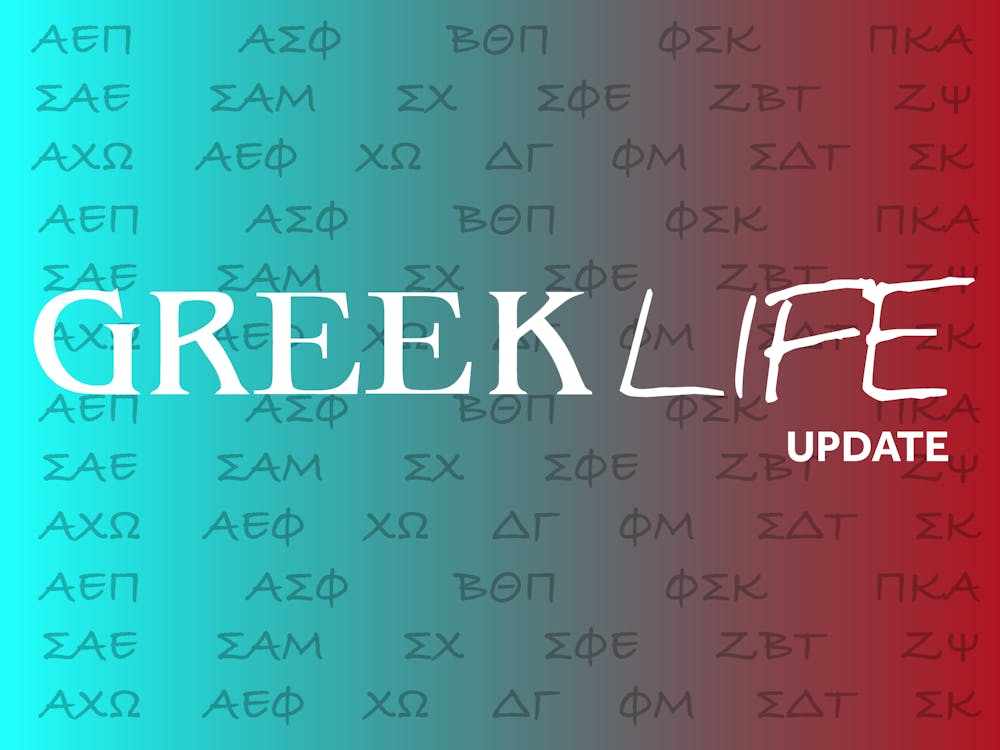Correction: The headline of this article incorrectly stated that the two IFC plans were released by the time of publication. "Releases" has been replaced by "announces."
A Jan. 22 statement from American University’s Interfraternity Council committing to make positive changes to the University’s fraternity community generated controversy among students, some of whom saw it as cosmetic following outcry over racism and sexual misconduct allegations in Greek life.
In the letter, council President Justin Colman introduced two reform plans: the Immediate Reform Plan and a Diversity, Equity and Inclusion Long-term Reform Plan.
Colman proposed “new accountability measures and updated policies” for issues of discrimination, harassment or racism within AU Greek life. He and the council plan to work to overturn practices of systemic and institutional barriers in the long-term.
Specifically, Colman plans to create an accountability system with AU’s Health Promotion and Advocacy Center, as well as a DEI committee. More details of the actions will be released later this week, he said.
The announcements were met with criticism from the Student Coalition to Abolish IFC and Panhellenic Greek Life at AU, which claims Greek life perpetuates issues such as systemic racism, classism and rape culture on campus. Over the summer of 2020, large numbers of students in Greek life disaffiliated, following uproar on social media.
“I feel like it’s a Band-Aid on a bullet wound,” said Alejandro Vasquez, a freshman majoring in foreign language and communication.
Stevie Early, the president of the class of 2024, is also skeptical about reform attempts. She argues that the prominence of Greek life nationwide presents challenges that require a more complex solution.
“I don’t think the plan for reform is going to be able to solve an issue that’s so in-depth,” Early said. “[Greek life] operates on a large scale, similar to a franchise. … There are so many fraternities and sororities, so many chapters, that I can’t necessarily blame the top because it’s impossible to be able to check on all of them.”
While they recognize that the contributing members of the council had good intentions, Early and Vasquez both support abolishing Greek life at AU.
“It’s a classist, [discriminatory] system,” Early said. “It’s time to understand that while you may love it, and while your personal fraternity may not have done something in the recent years, it’s contributing to the problem by [existing] in a system that allows it to happen in the first place.”
However, other students, such as Shira Cohen, a freshman in the College of Arts and Sciences, would rather keep Greek life. Cohen joined Sigma Delta Tau, a historically Jewish sorority, early in January.
“While it definitely may seem exclusive from an outsider’s perspective, I think the reason people want to abolish [Greek life] is because they don’t know how inclusive it actually is,” Cohen said. “At Sigma Delta Tau, one of our number one values is inclusivity.”
Some AU fraternities and sororities, like SDT, serve as affinity groups, namely for Jewish, Black or Asian students.
“[Sigma Delta Tau] is a safe space for Jewish women where we know that we can thrive regardless of outside pressures like anti-semitism,” Cohen said.
She said that the sisterhood is such a strong bond that is difficult to find elsewhere and that some members of sororities go on to become lifelong friends, which is a testament to the strength of Greek life camaraderie.
However, Vasquez and Early argue that Greek life isn’t necessary to have a fulfilling social life. Both cited alternatives for forming lasting friendships on campus, such as Vasquez’s suggestion of joining one of the University’s around 200 clubs that are not affiliated with Greek life.
Similarly, Early proposed the “dorm life model” as a potential replacement for fraternities in her Student Government campaign. Instead of the traditional Panhellenic chapters, Rice University, for instance, establishes “mock sororities” by grouping students by residence hall. Members can host events, play games, go out to dinner together and throw parties. She said the focus is on everyone being included, unlike in the traditionally-exclusionary Greek life recruitment process.
“[Students] are part of a club together and think of each other as brothers and sisters as you would in a fraternity,” Early said. “Even though it won’t fully dismantle the class issue, ... it does help bring diversity to the table.”
Many AU students share the view that Greek life is too problematic to continue and have expressed their doubt of the reform plan on Instagram.
“With changes over time, reform is possible,” Colman told The Eagle. “I think already, we’re headed in the right direction.”
He also claimed that abolishing AU Greek life would not entirely solve the larger problem, since racism, for instance, could occur anywhere on campus.
“[Reforming] is kind of like a precedent,” Colman said. “If we abolish [Greek life], these problems are still going to exist; chapters here will go underground.”
Despite this, racial sensitivity is of utmost importance to students who have since disaffiliated from Greek life.
Hannah Cisternelli, a junior who disaffiliated from the Phi Sigma Sigma sorority, said that an account on Instagram prompted her to rethink her affiliation. While Cisternelli did not observe any blatant displays of individual discrimination during her time in Phi Sigma Sigma, she said that some members habitually used racist language.
“You kind of pick up that there’s clearly a lack of diversity in [this] predominantly white organization,” Cisternelli said. “There was insensitivity that I noticed at social events that I wasn’t really comfortable with. People would say the N-word at parties.”
Edmeé Marie Faal, a senior who left the Delta Gamma sorority, feels that racism occurred frequently. While still skeptical about the reform plans, she hopes that AU Greek life can begin to have difficult but necessary conversations.





